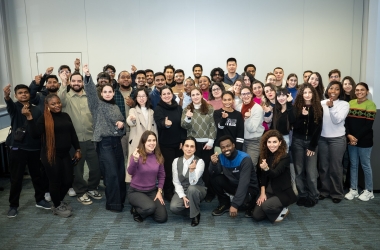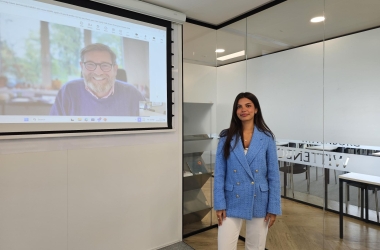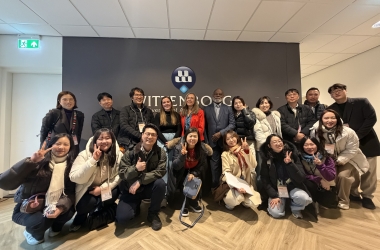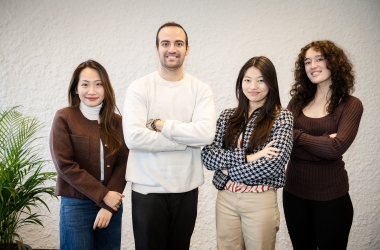-
-
2025 | 2026 - Education and Examination Guides - All Programmes
-
-
This glossary contains an overview of some of the terminologies, definitions and abbreviations used at Wittenborg University of Applied Sciences.
Wittenborg Online News!
Wittenborg Welcomes More Than 100 New Students for February 2026 Intake
Wittenborg Welcomes More Than 100 New Students for February 2026 Intake

https://www.wittenborg.eu/wittenborg-welcomes-more-100-new-students-february-2026-intake.htm
Students Join Bachelor, Pre-Master, Master and other Programmes in Apeldoorn, Amsterdam and Munich
Wittenborg has welcomed over 100 new students for its February 2026 block intake, joining the institution across its Apeldoorn, Amsterdam, Munich and OnCampus study locations.
The February intake reflects Wittenborg’s strong international profile, with students arriving from over 20 countries across Asia, Africa, Europe and more. Among the largest student groups are those from India, China, Nigeria, and Sri Lanka, alongside students from Türkiye, Egypt, Morocco, Brazil, Pakistan and several European countries.
Strong Demand for Business, Technology and Entrepreneurship Programmes
The majority of new students have enrolled in Bachelor of Business Administration (BBA) programmes, including specialisations in Artificial Intelligence & Cyber Security, Hospitality Management, Economics & Management, Information Management and Event Management. A significant number have also joined the Entrepreneurial Business Administration (EBA) programmes, with pathways in Entrepreneurship & Innovation, Digital Marketing, FinTech and Small Business.
At the postgraduate level, Wittenborg has seen strong enrolment in its Pre-Master leading to Master of Business Management, Master of Business Management (MSc), and Master of Business Administration (MBA) programmes. These students are specialising in areas such as Human Resource Management, Applied Artificial Intelligence, Digital Marketing & Communication, Logistics & Trade, Data Analytics, Cyber Security, Health & Social Care and International Management.
A Warm Welcome in Apeldoorn
Welcoming students in Apeldoorn, President Peter Birdsall encouraged the new cohort to embrace the challenges and opportunities of studying abroad, drawing on his own experience as an international student.
“It’s always a fantastic opportunity to go abroad — to change a life. I’ve done it myself,” he said. “Almost all of your staff and faculty will have gone through the same experience.”
Birdsall emphasised the importance of integration, student engagement, and personal responsibility. He encouraged students to meet people outside their own national groups, join societies, volunteer and make use of the international and expat communities in Apeldoorn.
“We’re here to help you succeed. We will do everything we can to make your degrees as valuable as possible, but at the end of the day, it is your responsibility to work hard and make the most of this opportunity.”
New Student Voices: Why They Chose Wittenborg
Several students from the February intake shared their motivations for choosing Wittenborg and their early experiences in the Netherlands.
Kardelen Aydin from Türkiye, enrolled in the Pre-Master leading to the MBM in Human Resource Management in Apeldoorn, described her first weeks adjusting to life in the Netherlands.
With a background in psychology, Aydin hopes to combine her previous studies with HR to strengthen her career prospects.
“I want to specialise in human resources and combine it with psychology so I can be stronger in the HR field and find a job after graduation.”
Aysan Seyedi from Iran, also studying the Pre-Master leading to the MBM in Human Resource Management, arrived in January.
“Wittenborg is a very popular international institution, and it was recommended to me by a friend,” she explained.
Looking ahead, Seyedi is focused on personal and professional development.
“I want to improve my communication skills, make international friends, and become a strong human resource professional.”
Himanshu Patel from India is enrolled in the Pre-Master leading to the MBM in Entrepreneurship & Innovation. He chose Wittenborg for its diverse international environment and practical business focus. “The cultural dimension at Wittenborg gives me a good base to connect and grow with people from different backgrounds,” he said. Having arrived before the Introduction Week, Patel has already begun exploring Apeldoorn.
“It’s a beautiful city. I’ve been exploring the streets, and it’s been an amazing experience.” Passionate about business and the food industry, he hopes to start his own enterprise in the future and develop his leadership skills during his studies.
WUP 11/02/2026
by Erene Roux
©WUAS Press
Tags
#SDG4: Quality Education
#Internationalisation
#internationalstudent
#Diversity
#Ethics
#apeldoorn
648 words
Guest Lecture by Jacinta Parsons Explores Podcasts, Media, and Audience Engagement
Guest Lecture by Jacinta Parsons Explores Podcasts, Media, and Audience Engagement

Jacinta Parsons Shares Insights to Authentic Podcasting
How do you connect with an audience so deeply that they feel part of your story? On 8 January, students at Wittenborg explored this question with Jacinta Parsons, author and broadcaster on ABC Radio Melbourne, who joined the lecture online from Australia. Parsons shared her insights into podcasts and the art of creating genuine connections with listeners, blending professional experience, practical advice and personal reflection. The session was moderated by Carlos Roos, Assistant Professor of Applied Sciences.
Parsons is the author of three books, Unseen, A Question of Age and A Wisdom of Age, and has worked in media for over two decades. Her experience includes broadcast hosting across multiple programmes and networks, radio music direction, podcast production and hosting, television presenting, training and live broadcast management.
A key focus of the lecture was authenticity in media practice. Parsons explained that authenticity is often misunderstood as something simple, when in fact it requires sustained effort. “Being authentic sounds easy, but it really isn’t,” she said. “It requires a lot of work to feel comfortable performing while being as real as you can to the essence of who you are.”
She stressed that audiences are highly perceptive and respond strongly to genuine communication. “When people are faking it, you know it,” Parsons said. “And there’s a repulsion that can happen when that’s felt.”
Parsons highlighted the importance of understanding audiences as individuals rather than as a collective mass. “Whenever you’re delivering anything in broadcasting, you’re speaking intimately into someone’s house, into their car, into their bedroom, into their shower,” she said. “Understanding that engagement at the individual level is paramount to everything you do.”
Discussing live radio and podcast production, Parsons described the balance between structure and spontaneity. “You come in with half your show programmed,” she explained, “but you allow the spontaneity and energy of the programme to influence how it will go.” She added that listening carefully and responding in real time helps audiences feel genuinely involved: “That’s where your audience begins to trust that they are part of the process.”
Reflecting on her career path, Parsons spoke about entering the industry through community radio and volunteering. “Every piece of work I do will be my best work, regardless of the level,” she said, noting that integrity and enthusiasm often matter as much as formal qualifications. She encouraged students to take opportunities even when they feel intimidating, adding that “the ones that show that spark of excitement often stand out.”
The lecture also addressed music culture and media consumption. Parsons spoke about Melbourne’s strong live music scene and the revival of physical formats such as vinyl and cassette tapes. She noted that the effort involved in physical media can deepen audience connection. “The labour of putting something on, rather than just pressing a button, converts to treasuring,” she said. “When you hold an album in your hands, there’s a sense that it’s yours.”
In response to a student question about criticism and public exposure, Parsons shared her approach to managing negative feedback. “When you come to your work with genuine authenticity and purpose, criticism is not as difficult to manage as you might imagine,” she said. She cautioned against performing from a place of fear, noting that anticipation of criticism can change how people communicate.
Parsons also spoke about podcast listening habits and recommended The Diary of a CEO as a useful example for students. She explained that studying successful podcasts can be instructive, adding that “listening to top and midline podcasts shows what audiences are gravitating towards in terms of style and connection.”
Reflecting on the session, Roos said the talk was the highlight of the Mass Communication class this year. “It packed a bit of everything: analogue and digital, mass and social media, communication technologies and human performance, all of it delivered with such a charming voice. This was a case of content matching form.”
WUP 09/02/2026
by Erene Roux
©WUAS Press
Tags
#SDG9: Industry, Innovation and Infrastructure
#Internationalisation
#internationalstudent
#Diversity
#research
684 words
How Football Ticket Pricing Shapes Fan Emotion and Purchase Behaviour
How Football Ticket Pricing Shapes Fan Emotion and Purchase Behaviour

https://www.wittenborg.eu/how-football-ticket-pricing-shapes-fan-emotion-and-purchase-behaviour.htm
Wittenborg Researchers Reveal How Partitioned and All-Inclusive Pricing Affect Eredivisie Fans
Football fans are passionate, but does the way tickets are priced really affect whether they buy them? Researchers from Wittenborg University of Applied Sciences explored how partitioned pricing, where a ticket’s base price is shown separately from service fees, compares with all-inclusive pricing, where the total cost is presented upfront.
The study, Understanding the Role of Partition Pricing vs All-Inclusive Pricing on Consumer Behaviour and Purchase Intention of Eredivisie Football Tickets, was published in 2025 in the Advances in Consumer Research journal. It was authored by Nikita Pahwa, Assistant Professor at Wittenborg, Bojan Georgievski, Associate Professor at Wittenborg, and Jochem Kaper from Erasmus University Rotterdam.
With matchday revenues accounting for 23–26% of total club income, understanding ticket purchasing behaviour is critical. Pahwa, Georgievski and Kaper investigated how different pricing models influence perceptions of price fairness, customer frustration, satisfaction and purchase intention among Eredivisie fans.
The team surveyed 139 fans via social media and online platforms. Participants were randomly assigned to either a partitioned pricing scenario, which included a 10% service fee, or an all-inclusive pricing scenario. The survey used a realistic ticket purchase simulation, including stadium seating options and prices, to mirror real-life buying decisions.
The results revealed that partitioned pricing significantly increased customer frustration, confirming the emotional costs associated with multiple fees, as predicted by Prospect Theory. However, there was no significant effect on perceived price fairness, overall satisfaction or purchase intentions.
“Our findings reveal a fascinating emotional paradox in sports marketing,” said Pahwa. “While splitting ticket prices into base costs and service fees significantly increases fan frustration, it does not actually stop them from buying the ticket. In the world of Eredivisie football, the emotional bond a fan has with their team, their team identification, is far more influential than the pricing strategy used at checkout.”
Regression analysis supported this observation, showing that team identification was a strong predictor of purchase intentions, explaining 11% of the variation. Fans with strong attachments to their teams were more likely to buy tickets regardless of how the price was presented, highlighting the dominance of hedonic motivations, where fans prioritise the emotional experience of attending a match over purely economic considerations.
“The intellectual contribution of this research has had a notable academic and practical impact by identifying how pricing structures influence consumer emotions versus actual purchase behaviour in the sports industry,” added Georgievski. “This study fills a critical research gap by applying behavioural economic theories such as Prospect Theory and Team Identification Theory to the unique, emotionally charged context of the European football market.”
Pahwa noted that the research can serve as a benchmarking model to test the threshold of partition pricing service fees for tournaments across the sports world, extending beyond football.
The research offers practical insights for football clubs, ticket platforms and marketers. Clubs can tailor pricing strategies, platforms can improve transparency, and marketers can design promotions that leverage fan loyalty and emotional connection. Policymakers can also use these insights to enhance consumer protection in ticket sales.
The authors note that the relatively low surcharge used in the study (10%) may have limited the impact of partitioned pricing. Future research could explore higher fees, wider fan demographics and other sports contexts to further understand how pricing, emotion and cognition interact to shape consumer behaviour.
WUP 04/02/2025
by Erene Roux
©WUAS Press
Tags
#Impact Statement
#research
#ResearchCentre
#Internationalisation
#Diversity
#SDG11: Sustainable Cities and Communities
586 words
Best Things to Do in Amsterdam in February 2026
Best Things to Do in Amsterdam in February 2026

https://www.wittenborg.eu/best-things-do-amsterdam-february-2026.htm
Events and Cultural Highlights to Brighten Winter in the Dutch Capital
February may be the shortest month of the year, but Amsterdam’s cultural calendar is packed with reasons to head out despite the winter chill. From vintage shopping and Latin dance nights to Chinese New Year celebrations and the annual chocolate festival, the city offers a mix of cosy indoor events and lively festivals.
Fair Priced Vintage – 6 to 8 February
Location: RAI Amsterdam
The biggest vintage market in Europe returns to Amsterdam this February. Fair Priced Vintage brings together hundreds of vendors offering second-hand clothing at accessible prices. Expect everything from everyday basics to standout statement pieces. Entry is free, but visitors are encouraged to reserve a time slot in advance.
Elixir Pub Quiz – 4 February
Location: Restaurant Elixir, Batjanstraat 1a
Test your knowledge at the monthly Elixir Pub Quiz, held on the first Wednesday of the month. Teams of up to five people can compete in a relaxed setting with questions covering general knowledge, music and surprises along the way. Free entry, good drinks and a lively atmosphere guaranteed.
Time: 20:00–22:00
OUT Latin Club Wednesdays – Various Dates
Location: OUT Latin Club Amsterdam
Dance your way through winter every Wednesday night at OUT Latin Club. Expect salsa, reggaeton, bachata, merengue and dembow in an energetic, authentic Latin setting. A popular midweek escape for dancers and music lovers alike.
Time: 22:00–04:00
Summer Breeze Latin Night – 12 February
Location: Westergasterrein
Summer Breeze returns with a special indoor Valentine edition. Spread across three areas, the night combines free dancing with optional group classes. A long-running favourite for salsa fans in Amsterdam. Tickets available online.
Jazz at the Pianola – 13 February
Location: Pianola Museum
An intimate jazz evening in a unique setting. Pianist Robert Rook is joined by Thomas Winther Andersen on double bass and Bart van Helsdingen on drums. Ideal for jazz lovers looking for something atmospheric and understated.
Boom Chicago: A Very Special Valentine’s Day – 14 February
Location: Boom Chicago, Rozengracht
Skip the traditional Valentine’s dinner and opt for laughs instead. Boom Chicago’s Valentine’s Day programme combines comedy, welcome bubbles and optional food packages, including sharing platters, cake or premium seating options.
Events run throughout the day with a brunch matinee at 12:00, an evening show at 18:00 and a late stand-up performance at 22:15.
Markets Across the City – February Highlights
Vinyl Market – 15 February
Location: De Hallen
IJ-Hallen Flea Market – 14–15 February
Location: NDSM Wharf
Maker Market – 21–22 February
Location: De Hallen
Amsterdam’s markets continue year-round, offering everything from handmade gifts and records to vintage finds and other interesting products.
Chinese New Year Celebrations – 17 February
Location: Zeedijk, Nieuwmarkt and surrounding areas
Celebrate the Lunar New Year in Amsterdam’s Chinatown along the Zeedijk area with traditional lion and dragon dances, parades, drums and firecrackers. Restaurants in the area mark the occasion with special menus and festive dishes. 2026 marks the Year of the Horse.
Amsterdam Chocolate Festival – 21 to 22 February
Location: Beurs van Berlage
More than 100 chocolate makers from around the world gather in the city centre for a weekend dedicated to all things cocoa. Taste, learn and join workshops exploring chocolate from bean to bar. Tickets required.
WRAPPED – Free Art Exhibition
Location: NOCKNOCK Studio, near Amsterdam Central Station
WRAPPED explores themes of change, time and new beginnings through a mix of artistic disciplines. A thoughtful, accessible exhibition that is free to visit throughout February.
WUP 02/02/2025
by Erene Roux
©WUAS Press
Tags
#SDG3: Good Health and Well-being
#Internationalisation
#internationalstudent
#studyinholland
597 words
Top Things to Do in Apeldoorn This February
Top Things to Do in Apeldoorn This February

https://www.wittenborg.eu/top-things-do-apeldoorn-february.htm
Must-See Attractions and Events in Apeldoorn in February 2026
February in Apeldoorn offers a variety of cultural, culinary, music and festive events for all ages. From local talent performances and carnival celebrations to electrifying parties and royal exhibitions, there is something for everyone. Here are the top events you won’t want to miss:
Open Podium – 8 February
Location: Theater Orpheus, Apeldoorn
Discover local talent during the free Open Podium at Theater Orpheus. Part of a collaboration between three theatres in the Gelderland Stedendriehoek, this event features three amateur acts performing for 30 minutes each. Expect bands, chamber music, cabaret, spoken word and more. Performances are free and open to all.
Time: from 14:30
Entrance: via Restaurant O55, Loolaan side
Klarenbeek Carnival Parade – 14 February
Location: Station Klarenbeek and surrounding streets
One of the largest carnival parades in Gelderland takes place at Klarenbeek, starting at 12:00 from Goorweg near the station. The parade features decorated floats and walking groups. After the parade, festivities continue at Krakershol, including a prize ceremony at around 17:00. Limited parking is available and road closures apply, so visiting by bicycle is recommended.
Time: 12:00–17:00
Valentine’s Pancake Dinner – 14 February
Location: Nettenfabriek, Apeldoorn
Celebrate Valentine’s Day with a cosy pancake dinner at Nettenfabriek. Share delicious pancakes in a warm and intimate setting. Advance reservations are recommended due to limited availability.
Time: 12:00–20:00
Piña Latin Party – 20 February
Location: GIGANT, Nieuwstraat 377, Apeldoorn
Dance to reggaeton, salsa, bachata, merengue and more at GIGANT’s Piña Latin Party. The tropical-themed evening features hits from Daddy Yankee, J Balvin, Sean Paul and Romeo Santos. Dress in Latin-inspired outfits for a lively night of music and fun. Entry is 18+ with ID required.
Time: 21:00–02:00
Après-Ski Party – 21 February
Location: Pannenkoeken Boetiek, Apeldoorn
Bring the Alps to Apeldoorn at the Après-Ski Party. Dress in ski-themed outfits and enjoy a night of upbeat music and sing-along tracks from DJ Bradley. A festive winter atmosphere for party-goers and music lovers alike.
Time: 20:00–00:00
ABNORMAAL ‘In De Kerk’ – 27 to 28 February
Location: Grote Kerk Apeldoorn
The final edition of ABNORMAAL ‘In De Kerk’ brings house, techno and hard techno into the historic Grote Kerk. Friday focuses on house and trance with rising talent such as Lisa Korver, while Saturday showcases techno and hard techno with acts including SANTØS, NZGÛL and XRTN. A high-energy electronic music experience in a unique setting.
Times: 27 February, 17:00–00:00 | 28 February, 17:00–00:00
Dresscodes Exhibition at Paleis Het Loo – Until 8 March
Location: Paleis Het Loo, Apeldoorn
Explore the Dresscodes exhibition at Paleis Het Loo, showcasing royal fashion from Queen Wilhelmina, Queen Emma and Queen Máxima. The exhibition also features red-carpet outfits worn by international celebrities including Kendall Jenner, Margot Robbie, Salma Hayek and Princess Diana. Themes include ceremonial attire, gala wear, mourning, weddings and outdoor fashion, highlighting both formal rules and unwritten court traditions.
Opening times: as per Paleis Het Loo standard hours
WUP 02/02/2025
by Erene Roux
©WUAS Press
Tags
#SDG3: Good Health and Well-being
#Internationalisation
#Diversity
#internationalstudent
#apeldoorn
517 words
Wittenborg Munich Student Highlights Corporate Mobility Experience at Alphabet
Wittenborg Munich Student Highlights Corporate Mobility Experience at Alphabet

Aya Abdalla Concludes Work Placement Module with Oral Defence in Amsterdam
Wittenborg University of Applied Sciences student Aya Abdalla recently travelled from Munich to Amsterdam to deliver her Work Placement Oral Defence, marking an important milestone in her Bachelor of Business Administration (BBA) journey. Aya is enrolled in the International Business Administration (IBA) programme with a specialisation in financial services, offered through Wittenborg’s partnership with the New European College (NEC). Under the guidance of her supervisor Sascha Liebhardt, Campus Director in Munich, she reflected on her professional experiences during her visit.
Originally from Dubai, Aya is in the final stage of her studies. She used the Work Placement module, compulsory for all IBA, MCI, HBA, and EBA students, to gain hands-on experience in an international business environment. The module enables students to apply academic knowledge in real-world settings and develop skills essential for their future careers.
Aya completed her placement at Alphabet International, a leading provider of business mobility and full-service leasing operating in thirty-eight countries and supported by the global strength of the BMW Group. She described Alphabet as a company that “crafts efficient, innovative mobility solutions that simplify fleet management, drive sustainability and empower businesses globally.”
During her placement within the international sales team, Aya prepared Tender Review Board (TRB) documentation, conducted credit, compliance, and hierarchy checks, maintained tender pipelines, drafted pricing instructions, and produced presentations for internal stakeholders and clients. She also worked with various international markets to collect market insights, pricing information, and updates on active prospects.
Aya highlighted her work on specific projects, saying, “Supporting the new markets team in benchmarking Alphabet’s digital visibility across partner websites and delivering a crisis proposal for BEV blackout response in Spain and Portugal was very interesting.” She reflected that the placement helped her develop skills in strategic and financial reasoning, analytical reporting, process optimisation, business communication, leadership, and intercultural teamwork.
She also noted that working on her thesis and communicating with various stakeholders was particularly rewarding: “Seeing ideas turn into implementable action is one of the most rewarding aspects of my placement. This is still a work in progress, to be finalised in January 2026.”
Aya described the placement as a period of genuine development, during which she became more confident, structured, and proactive. She discovered strengths in data storytelling and strategic thinking and gained experience in analytical reporting, process optimisation, and communication under pressure. Working alongside a team of more than thirteen nationalities enhanced her ability to work interculturally and adapt communication styles for different stakeholders. Her technical skills grew through regular use of tools such as Salesforce, Power BI, COIN, GAIA, Moody’s, Excel, and PowerPoint.
She praised the supportive culture at Alphabet, noting, “The inclusive and collaborative environment, combined with mentorship from experienced professionals, challenged me while providing consistent guidance.” Team activities, including sports sessions in Munich’s English Garden, reformer Pilates, and an Isar river cleanup, contributed to a sense of community among colleagues.
Reflecting on her visit to Amsterdam, Aya said, “It was a short visit of 12 hours. Trying the famous cookies at Van Stapele and strolling around to admire the culture in the city before my flight was quite an experience. Visiting the Anne Frank Museum also gave me some insights into history.”
Offering advice to future students, Aya suggested, “Stay curious, proactive, and emotionally intelligent. Document all learnings and link them to academic theory. Focus on delivering measurable value, learn to prioritise effectively, and don’t be afraid to say no under pressure.”
Looking back on her experience, Aya concluded, “This internship was more than a professional step. It was a transformation. I learnt that impact lies not in doing more but in doing meaningfully. At Alphabet I learnt to see data as a story, people as partners, and challenges as opportunities.”
WUP 30/01/2025
by Erene Roux
©WUAS Press
Tags
#Internationalisation
#internationalstudent
#SDG8: Decent Work and Economic Growth
#Diversity
#Ethics
#studyinholland
658 words
Wittenborg Hosts Education Study Tour with Teacher Delegations from Korea
Wittenborg Hosts Education Study Tour with Teacher Delegations from Korea

https://www.wittenborg.eu/wittenborg-hosts-education-study-tour-teacher-delegations-korea.htm
Strengthening International Exchange on AI and Digital Innovation in Education
On 25 and 26 January, Wittenborg’s Amsterdam study location welcomed two delegations of middle school teachers from Daegu and Seoul, Korea, as part of an international study tour focused on the use of Artificial Intelligence (AI) and digital tools in the Dutch education system. More than 75 teachers, selected by the Metropolitan Office of Education under the Korean Ministry of Education, participated in the programme, organised by Amy Abdou, Senior Lecturer at Wittenborg.
Alongside lectures at Wittenborg, the delegations visited several secondary schools in Amsterdam to observe classroom practices and institutional approaches to digital innovation in education.
The first lecture was delivered by Hind Albasry, Associate Professor at Wittenborg. She outlined how AI can support personalised learning trajectories through adaptive scaffolding, particularly for students with learning difficulties. Using mathematics as an example, she explained how AI-based systems can diagnose recurring errors and respond with simpler exercises and additional explanations tailored to individual learners.
Albasry emphasised that students are particularly vulnerable users of digital technologies. Strong data protection frameworks, child-specific privacy safeguards and equitable access are therefore essential. She situated these considerations within the Dutch model of coordinated decentralisation in education governance, which aligns with the EU AI Act and the General Data Protection Regulation (GDPR).
She presented the Dutch digital education ecosystem as a multi-layered structure, spanning national policy and regulation, support organisations such as Kennisnet, procurement and vendor governance through SIVON and interoperability initiatives coordinated by SURF and EDU-V. At school level, implementation varies widely, reflecting differences in teacher competences, infrastructure and institutional readiness. Current developments include adaptive learning technologies, AI research pilots through the National Education Lab AI (NOLAI) and the formulation of national digital literacy learning outcomes.
The second lecture was given by Karcie Snoeijen, Project Lead Business and Innovation at NOLAI in Tilburg. She introduced NOLAI as a national innovation lab funded for ten years by the Dutch National Growth Fund to conduct applied research and pilot projects in educational AI. Since 2023, NOLAI has launched 26 projects in collaboration with universities, schools and educational technology companies, with early results published mid-2025.
Wittenborg Hosts Education Study Tour with Teacher Delegations from Korea
A defining feature of NOLAI’s approach is teacher-led co-creation. Educators formulate the research questions, participate in design and testing and validate prototypes in their own classrooms. This process brings together the different timeframes of research, schooling and industry within a protected experimental environment. Examples of projects include speech recognition for children reading in different dialects, AI-supported vocabulary learning in virtual reality, adaptive tools for students with developmental language disorders and AI-assisted support for reading instructions in pre-vocational education.
Snoeijen stressed the distinction between general purpose generative AI and educational AI designed specifically for teaching and learning. While young people make widespread use of AI, surveys indicate both high expectations and significant concerns regarding pupil dependency and teacher preparedness. NOLAI therefore advocates a hybrid, augmentation-oriented model in which teachers retain pedagogical authority and AI supports rather than replaces professional judgement.
Central to this vision is the concept of hybridity, combining human expertise with adaptive technologies, clearly defining which tasks can be automated and ensuring teachers maintain agency in shaping AI integration. Through initiatives such as the Teacher in Residence programme and alignment with European digital competence frameworks, NOLAI seeks to strengthen professional development, digital literacy and responsible innovation across the Dutch education system.
Tags
#GRT1: Digital Revolution
#Internationalisation
#Diversity
#research
#SDG17: Partnerships to achieve the Goal
592 words
How Early Online Interactions Shape Brand Image: New Study Reveals Key Cultural Differences
How Early Online Interactions Shape Brand Image: New Study Reveals Key Cultural Differences

Wittenborg’s Adam Jones Co-authors Study on Value Co-creation in the ‘Dreaming’ Phase
A newly published article in the Journal of Services Marketing sheds light on how consumers’ earliest online interactions, before they even begin planning a purchase, play a decisive role in shaping service-firm brand image. The study, titled ‘Online Value Co-creation During the ‘Dreaming’ Phase, Brand Image and Uncertainty Avoidance,’ was co-authored by Wittenborg associate professor Adam Jones, together with Francisco Peco-Torres, Ana Isabel Polo-Peña and Dolores M. Frías-Jamilena.
The research presents an explanatory model for understanding how brand image forms in the online environment during the ‘dreaming’ phase, when consumers first begin to fantasise about future service experiences, often without any clear intention to buy.
Using the lens of Service-Dominant Logic (SDL), the authors examine how value is co-created through online interactions between consumers and three key actors: the firm, online platforms and other consumers. The study then analyses how these interactions influence brand image and how the effects vary depending on consumers’ uncertainty avoidance.
Cross-cultural insights from Spanish and British consumers
To investigate these relationships, the authors surveyed 607 hotel guests – 310 Spanish (from a high uncertainty-avoidance culture) and 297 British (low uncertainty-avoidance culture) – who had interacted with online sources during the very initial stages of their consumer journey.
The results reveal a strong cultural split. For Spanish consumers, online value co-creation with online platforms and other consumers significantly strengthens brand image, while co-creation with the firm’s online media shows no significant effect.
For British consumers, the opposite occurs: co-creation with the firm produces a strong positive influence on brand image, while interactions with platforms or other consumers do not show a meaningful impact.
Commenting on these findings, Jones emphasised the importance of recognising these cultural differences. “Our results make clear that consumers from different cultures co-create value in very different ways. High uncertainty-avoidance consumers rely heavily on online platforms and other users, while low uncertainty-avoidance consumers draw more from the firm’s own online media. Understanding this distinction is crucial for international service firms.”
Strategic online reputation management as a key driver
The study also shows that strategic online reputation management is a significant antecedent of value co-creation across all channels. When firms encourage online reviews, respond to feedback and analyse user-generated content, this boosts value co-creation with the firm, platforms and other consumers – even in the earliest stages of the journey.
The associate professor explained that this early engagement matters more than firms often realise. “What we show is that brand image doesn’t begin forming at the moment of planning or booking. It begins much earlier, when consumers are simply imagining possibilities. In this dreaming phase, even light or casual online interactions can start shaping how they perceive a service brand.”
Advancing SDL theory and offering practical guidance
The research extends Service-Dominant Logic theory by confirming the multi-actor nature of online value co-creation. It is also one of the first studies to measure co-creation specifically during the dreaming phase and to examine brand image in relation to cultural differences in uncertainty avoidance.
Beyond the theoretical contributions, the findings offer actionable insights for service firms operating internationally. The authors highlight that companies seeking to attract high uncertainty-avoidance consumers should prioritise strong visibility on independent online platforms and stimulate user-generated content. Firms targeting low uncertainty-avoidance consumers, meanwhile, benefit from investing in inspirational brand-owned online media.
Jones noted that these insights can help companies build stronger relationships with customers earlier in the process. “Being able to map how brand image forms from the very first spark of interest gives firms a clearer strategy for online engagement. They can target consumers with the right type of content on the right channels, at the exact moment when initial impressions are being formed.”
WUP 26/01/2025
by Ulisses Sawczuk
©WUAS Press
Tags
#Impact Statement
#SDG9: Industry, Innovation and Infrastructure
#Internationalisation
#research
#GRT1: Digital Revolution
655 words
Meet the Newly Appointed Student Representatives at Wittenborg for 2026
Meet the Newly Appointed Student Representatives at Wittenborg for 2026

https://www.wittenborg.eu/meet-newly-appointed-student-representatives-wittenborg-2026.htm
Wittenborg’s 2026 Student Representatives, Led by Jasmine Shaw
Wittenborg has introduced its Student Representatives for 2026, elected in November 2025 and officially presented at the institution’s Christmas event in December. Bringing together diverse international perspectives, the new representatives are ready to serve as the voice of the student community and help shape an even stronger Wittenborg experience.
Working closely with students, faculty, and leadership, the 2026 Student Representative team will focus on strengthening communication and representing student perspectives.
Jasmine Shaw
Jasmine Shaw is from South Africa and is studying for a BBA in Marketing and Communications, specialising in Digital and Social Media. She became a student representative to address areas where she could make meaningful improvements for her fellow students.
“I want to make my fellow students feel really listened to and address each concern with an open mind,” Jasmine says. Her priorities include supporting student well-being, advocating for fair academic policies and creating more opportunities for student involvement through events and feedback forums. She also hopes to improve scheduling and timetabling to reduce unnecessary stress.
Arshia Baharloueiyancheshmeh
Arshia Baharloueiyancheshmeh from Iran, studying for a bachelor’s in Sport Business Management, has previously served as a student representative.
“I want to make sure students feel heard, supported and represented,” he says. Arshia’s priorities include improving communication between students and the administration, supporting internships and industry connections, addressing accommodation concerns and organising events to bring students and staff together.
Shelly Anand
Shelly Anand is originally from India and based in the Netherlands, and is pursuing an MBA in Data Analytics. She brings over 18 years of experience in banking, finance and entrepreneurship.
“I wanted to become a student representative because I genuinely enjoy connecting with people and supporting others,” Shelly explains. She focuses on fostering a supportive student community, strengthening communication between students and staff and helping international students adapt to life at Wittenborg. Shelly is also committed to practical learning opportunities that prepare students for the changing job market.
Heer Dhandha
Heer Dhandha is from India and is studying an MBM in Digital Marketing and Communication. She also has previous experience in school management in her home country.
“I want to ensure every student’s voice is heard and their concerns are addressed,” Heer says. Her focus is on improving communication, supporting student well-being, addressing academic and campus-related concerns and encouraging collaboration within the student community. She also emphasises mental health awareness and flexible academic support.
Kyal Sin Lin (Hazel)
Kyal Sin Lin, also known as Hazel, is from Myanmar and is studying MCI in Marketing and Communication.
“I want to create a space where every student’s voice is heard and supported,” she explains. She focuses on communication, well-being and student support, using check-ins, anonymous forms and open conversations to gather feedback. She also aims to help students manage academic pressures with practical strategies and peer support.
Nguyen Thi Mai Phuong and Mohammadali Eslamian complete the list of elected student representatives for 2026.
WUP 23/01/2025
by Erene Roux
©WUAS Press
Tags
#SDG4: Quality Education
#Internationalisation
#internationalstudent
#Ethics
#Diversity
517 words
Research Highlights Role of Personalisation and Trust in Green Finance
Research Highlights Role of Personalisation and Trust in Green Finance

https://www.wittenborg.eu/research-highlights-role-personalisation-and-trust-green-finance.htm
Study by Dr Ahmed Mehta Reveals Key Drivers of FinTech Adoption for Sustainable Investing
A new study led by Wittenborg associate professor Ahmed Mehta explores how FinTech solutions – particularly robo-advisors – can support the global transition to sustainable finance. Published in Scientific Reports, the paper, titled ‘FinTech Adoption for ESG Integration through Robo-Advisors, Personalisation and Perceived Trust’, identifies the factors that shape investors’ willingness to use digital platforms for green investment decisions.
The research was co-authored by Aizhen Chen (Zhuhai College of Science and Technology, China), Shaosong Wang (Macau University of Science and Technology), Muhammad Asif (University of Education, Lahore, Pakistan), Shuo Xu and Muhammad Farrukh Shahzad (Beijing University of Technology).
The team surveyed 393 investors in China, all of whom had experience using FinTech tools for Environmental, Social and Governance (ESG) integration. Using quantitative methods, the authors analysed how robo-advisor usage, awareness of ESG factors and portfolio personalisation affect perceived usefulness, ease of use and intention to adopt green FinTech platforms. The study also investigated the moderating role of trust in these relationships.
Personalisation and trust as key influencers
Among the study’s most notable findings is the strong influence of personalised ESG portfolios on investors’ behavioural intentions.
When FinTech platforms tailor investment options to reflect individual sustainability preferences, users are more likely to adopt them. This personalisation was also found to enhance perceived usefulness and ease of use, two central elements of the Technology Acceptance Model (TAM) used in the research.
While investors may be aware of ESG factors, this awareness alone is insufficient to drive their decision-making, implying that other elements, such as perceived usefulness and perceived ease of use, may play a more critical role in influencing adoption behaviour.
In addition to that, the study suggests that the mere availability of robo-advisors for green investment may not be enough to drive investors’ intent to adopt these platforms. According to the researcher, this has important implications for how financial institutions design and market green digital platforms. “Developers should move beyond the purely technical aspects of FinTech and focus on features such as transparency, data security and personalisation,” he notes.
Mehta underlines that while trust is generally considered a key driver in technology adoption, it may not be sufficient to amplify the influence of ESG awareness or robo-advisor functionality alone in motivating adoption. “This underscores that personalised ESG offerings, which involve more tailored and sensitive financial decisions, require a stronger foundation of trust to be effective.”
The study suggests that enhancing the customisation capabilities of robo advisors and ensuring data security and transparency can foster greater trust and ultimately higher adoption. “By focusing on personalisation, trust-building and meaningful ESG engagement, FinTech platforms can play a more effective role in advancing sustainable investment behaviour,” the associate professor concludes.
WUP 21/01/2025
by Ulisses Sawczuk
©WUAS Press
Tags
#SDG9: Industry, Innovation and Infrastructure
#SDG12: Responsible Consumption and Production
#Internationalisation
#research
#Impact Statement
490 words

